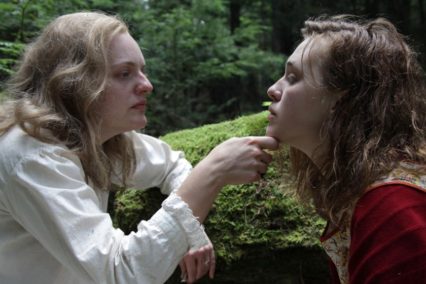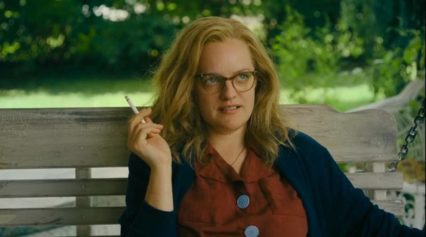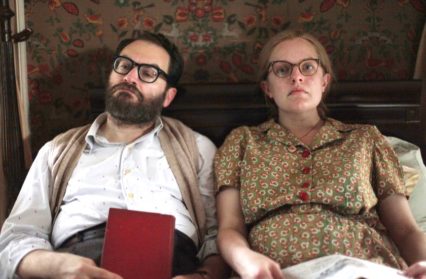What does it mean to put a writer’s life up on the screen? Max Ashworth looks at the recent resurgence of interest in Shirley Jackson’s work through the prism of the recent troubling biopic, Shirley.
I’m not sure who this film, and book, is for.
So, we’ll plough right on in, abruptly and without introduction, just like Shirley does. Almost within the first five minutes of Shirley we get sledge hammered with character: “Tell me about your shotgun wedding,” is a cruel way of announcing a woman’s pregnancy to the father who was hitherto unaware, an unfair way of revealing personality early on, and is glaringly disingenuous. As if Shirley were an obnoxious character in one of Jackson’s stories.
Needless to say, I don’t recognise Jackson here. We never met of course, she died before I was born, but having read three biographies and two memoirs, and all the novels, lectures and short stories, I too feel on first name terms. Still, it would never have occurred to me to jazz up the facts into fraudulence, add to the warehouse folder called fake news. And I’m trying very hard not to be cross, because, in reluctant mitigation, there’s a lot of macro to like here: in set design, lighting and cinematography, it’s a very tactile film.
For the sake of clarity, I’ll refer to the novelist as Jackson, and to ‘Shirley’ as the version of Jackson that appears in her own non-fiction, which also helps me avoid getting bogged down in the ‘Shirley’ (character) vs. Jackson (novelist) debate, and the weak attempt to introduce a ‘clever’ doppelganger, a bifurcation argument.
Shirley covers a brief period after Jackson and her husband, critic Stanley Hyman, moved from New York to Bennington, Vermont, and yes, she was morbidly curious about the disappearance of a young student from her husband’s university. In the movie, this environment turns Jackson to the writing of her second novel, Hangsaman. She is depicted by Elisabeth Moss as acerbic, alcoholic, depressed, and largely bed-ridden. This is also a childless house. In reality, Jackson had had three of her four children by the time she was writing Hangsaman, bringing them up with little to no help from her husband. One of her children has since recalled that his mother was always writing, but never absent. “Dinner was always on the table.” That Josephine Decker’s movie of Sarah Gubbins’ screenplay of Susan Scarf Merrell’s novel omits this is one thing, but to replace it with an atmosphere of cruel animosity and writer-myth, eschewing a warm and witty family life for a sub-par Who’s Afraid of Virginia Wolf? pastiche is quite another. Furthermore, Jackson’s third biographer, Ruth Franklin, found no evidence among Jackson’s papers that this milieu led to this creative intensity.
Jackson did indeed spend some time bed-ridden, but not until many years after this film is set, when she was writing her sixth novel, We Have Always Lived in the Castle, under the heaviest circumstances towards the end of her life. She was five chapters into her seventh novel, which was apparently intended as a departure from her contemporary domestic gothic (Come Along With Me), and halfway through a children’s fantasy story, The Fair Land of Far, when she died in her sleep of a heart attack. The attack was exacerbated by morbid obesity and anxiety, which was in turn also exacerbated by her addiction to prescription medications to cure her agoraphobia, and amphetamines to control her weight, but could not have helped her anxiety. She was 48. Her youngest child Barry, 11, was alone in the house when he discovered her body.
Despite her wonderful writing, Jackson is hardly a household name, so I ask again: who is this film for? It will not please Jackson fans as it goes to great lengths to portray her as a bitch, not a witch. And her student-shagging husband is presented as some kind of a legend, pandering to Jackson’s — rather ‘Shirley’s’ — bed-ridden demands. In reality, he only helped out during Jackson’s last, desperate, year, but still continued his student affairs during his wife’s crippling agoraphobia.

Jackson mostly put to use her own internal strengths and weaknesses to provide the psychology of her female protagonists, who were often also strong but deeply flawed. All of her male characters are professional but ineffectual, kind but grossly misguided. Unlike in the movie, where Jackson craves the approval of Stanley, who stands over her work as a validating God, Jackson’s husband was never allowed to read her work in progress. She did not need encouragement, advice, or a muse.
Although a novelist, Merrell’s work is much more in keeping with Lytton Strachey’s mode of ‘debunking the biography’ (Eminent Victorians, 1918), whereas the other two Jackson biographies are very much ‘just the facts’ and are written in an academic and readable style whereby the writer/biographer is absent. Merrell inserts herself into Jackson’s life, re-imagining events and creating new events to suit her purpose. She wins the prize for the opening title card competition of a biopic, “Some scenes have been created for dramatic purposes”. And for this reason, I shouldn’t complain. My main problem is that Merrell doesn’t seem to actually like Jackson very much, and certainly not her children, but is rather keen on the husband. I guess including the children would have forced Merrell into even more porkies, or maybe the lack of family life is meant to portray ‘Shirley’, and by implication, Jackson, as an absent mother, which is one hell of a whopper. This is a film made by women and based on a novel by a woman, so I would have expected a more sympathetic tone to the subject matter. It would be interesting to know what Jackson’s female champions think of Shirley: Joyce Carol Oates, Joanne Harris, Elaine Showalter and Donna Tartt, although I have an inkling.
I guess the question here is: is Jackson interesting enough, and is having her life fictionalised doing her, her fiction and her fans justice? Plato said that there is more truth in fiction, and life is so haphazard and full of meaningless events that instead a didactic narrative provides structure and meaning, a journey, and of course a beginning, middle and an end. To this effect, Jackson’s life was haphazard and sometimes beyond her control, and an early death put paid to an ending that can provide edification and greater understanding, ‘not with a bang but a whimper’. However, Shirley provides merely a snapshot of Jackson’s ‘life’.
Recent debate argues that all biographies are fiction, especially when about deceased writers. Hermione Lee states that history is seen through a contemporary lens and so truths are constantly shifting. Like Chinese Whispers, biographers write not about the way it happened, but the way they remember it. Biographies, of course, are not water-tight and contain many pitfalls; they concern the individual and the context, and the private and the public, with the public as a reflection of the private with the private realm to be assumed as foundational, which is odd as biographies are usually written about public people who project a persona. So the dominant passages of everyday life form, conveniently for this essay, a gothic trope of bifurcation, dislocation and a split between what should have been kept concealed and what has remained secret but has slowly come to light.
It is quite common now to see television programmes with actors playing exaggerated versions of themselves, from Larry David, Gary Shandling, Steve Coogan and Rob Brydon in The Trip, Paul Whitehouse and Bob Mortimer in Gone Fishing, and a second series of Staged with Michael Sheen and David Tennant. Her memoirs, while being about the children, feature Jackson as a character, and she portrays herself as an indulgent long-suffering mother, wife and housewife, biting her tongue when chatting with villagers and struggling to balance all this with occasions when she can read or write. I think the expression is a saint, but not a martyr.
Blatantly Jackson’s life deserves more than this, and while I accept her memoirs of family life may have an element of fiction to them, we suspend disbelief when reading a novel with a first person narrator; of course one doesn’t believe that Jackson remembered and transcribed conversations verbatim, but in her memoirs, you feel the overall flow and tone to be consistent.
In Shirley we see the dinner party hostess holding court; but we don’t see the mother getting the children ready for school. We see a woman who is hard to like, difficult and pedantic. It’s understandable that Jackson was defensive and aloof at first. Her first short story ‘The Lottery’ (1948) raised all kinds of hell. Subscriptions to The New Yorker, where it was published, fell, and Jackson was receiving hate mail and death threats; many reviewers (this one included) also see an undercurrent of anti-Semitism and anti-intellectualism that the family had to endure from the local community – Jackson’s husband was Jewish, and even in post-war New England, this didn’t go down well, so guests to the Jackson-Hyman house were more likely to be JD Salinger, Ralph Ellison, and Dylan Thomas, than bitchy neighbours or colleagues. (In fact, there are three Jackson poems that allude to a late night romantic garden encounter with Dylan Thomas. Why leave out this juicy literary gossip? If you’re going to portray her in a bad light, then who better to pair her with than Dylan Thomas?)
Raising Demons and Life Among the Savages, and of course, Ruth Franklin’s excellent biography A Rather Haunted Life, are a better ‘in’ to Jackson. Her life and work was indeed a juxtaposition of control of and subservience to her inner demons, but during Hangsaman she was very much in control of herself and her family. It’s laughable and demeaning to suggest she needed a companion, a muse to help put a story together about a student who is bemused by lothario lecturers and poisonous cliques, and succumbs to schizophrenia and madness. Jackson certainly did not need any help putting that story together.

Elizabeth Moss as ‘Shirley’ is directed unsympathetically as Jackson: dismissive and impatient, cruel and unapologetic and, wait for it: aggressively Sapphic, which is a new one on me. There is no evidence for this, and no suggestion of any evidence for it. Why reinvent her as a closet lesbian? In the context of other inventions in the film, there is more than a suspicion it is there only to play into the picture of the Jackson-Hyman house as a controversial den of debauchery.
To portray Jackson in squalor ignores the realities of her existence. She was for long periods the household bread winner, and then there were her breakfast duties, driving hubby and kids to work and school, coming home and doing the housework, then getting dinner ready, collecting everyone, preparing pre-dinner cocktails for her husband, dinner, bedtime, bed, sleep, repeat. And somewhere in that hectic day she was a prolific writer. To present her as a chain-smoking and aggressive drunk is not only patently untrue, it is offensive.
All of ‘Shirley’s’ whims, longings, and mostly fictional secrets are laid bare; the movie lacks the nuance and subtlety, irony and humour of Jackson’s crisp prose. Nothing in Shirley is under the surface because it’s all in your face, so now deal with it, as fictional ‘Shirley’ would say. Shirley fails to present ‘Shirley’ as anything like a true Jackson creation.
Max Ashworth is a regular Wales Arts Review contributor.












